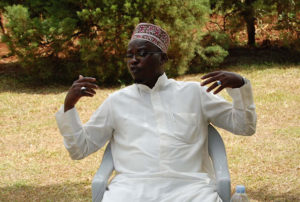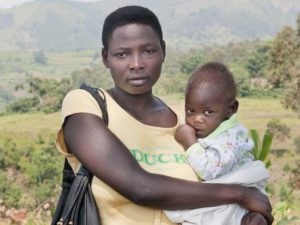
MAYUGE— Talking about sexual and reproductive health (SRH) is not easy for men, especially in the rural traditional societies of Uganda where it is considered a taboo.
But men in Mayuge have set out to break the yoke and venture into the waters of what had hitherto been regarded as a preserve for the women.
Instead of spending weekends at drinking joints in rural areas, men in Mayuge district instead spend their weekends hunting for better ways of caring for their family members and teaching adolescent girls and teenage mothers about reproductive issues.
In Bukatube sub-county in Mayuge district, a group of 15 men under Male Action Groups [MAGs] is not only advocating for an end to child marriage but also girl child education through home visits, community dialogues and public awareness campaigns.
At the community meetings, defilers and their accomplices are named and shamed, education of girls is slowly but surely being prioritised and faith leaders have vowed to verify the age of girls before blessing their marriages.
Mr Moses Kato, the MAGs chairperson Bukatube sub-county in Mayuge district, says they have grouped themselves in MAGs and go through the villages daily teaching Reproductive Health Education to adolescents.
“We actually find it a powerful way to raise the community’s awareness on the need to safeguard the girl-child’s reproductive health, especially by preventing early pregnancies, STDs; and HIV/Aids,” says Mr Kato.
He explained that through the MAGs, the local men are working together to provide education to teenagers and child mothers in bid to enhance their access various reproductive health choices.
Mr Kato revealed that the MAGs Programme aims at promoting collaboration between parents, the health workers and community leaders to ensure that the girl-child is retained in school to complete the cycle and build a solid foundation for them.
“The programme is designed to help teenagers to stay in school or, at least, obtain their O’level certificate; to postpone subsequent sex until they are 18 and hopefully beyond that; to find and maintain employment; and to develop a plan for their marriage later in life,” Mr Kato says.
He says Straight Talk Foundation with funding from the United Nations Population Fund (UNFPA) is funding the activities to support the formation and activities of Male Action Groups in Mayuge and surrounding districts.
In the villages of Mayuge, where teens often have limited access to family planning services due to cultural taboos, MAGs is giving family planning lessons besides providing life skills to adolescent girls at risk of child marriage and teenage pregnancy.
Mr Kato says they have groups of 15 men in the four parishes of Bukatube sub-county to counsel adolescents.
He says they are also teaching girls to use contraceptives, including condoms, oral pills and injectable, as part of sexuality education in addition to abstinence.
“And because girl-child is already sexually active, we also want them to know where to get these products so as to protect themselves against sexually transmitted diseases and prevent unwanted pregnancies,” Mr Kato says.
He says families in Mayuge through MAGs efforts have also started providing sexual education services for teenagers, including the right to delay marriage and refuse early sexual advances.
Pastor Peter Legendo,a member of MAGs, said they have discovered that the girls are interested in knowing about HIV/Aids, reproductive health, puberty and the resulting physical changes in the body.
“And most of the teenagers interviewed consented they knew nothing about contraceptives and where to find them,” Mr Legendo said.
He said the MAGs programme began last year in October and serves teenagers in schools and teenage mothers in the communities.
“We also encourage parents to take back teenage mothers back to school if they are willing or enroll them in skills training institutions,” Mr Lugendo said.
“We have also impacted upon schools to start the distribution of menstrual hygiene supplies and evidence gathering on their effect in school attendance, retention and completion,” he added.
Mrs Felistus Kulazikulabe, a house wife, says she feels men are now taking up their role in helping children to grow up responsibly.
“I feel this is worthwhile for our husbands to offer help our adolescents and teenager mothers,” Mrs Kulazikulabe said.
Mr Omar Bongo, the LCV chairman for Mayuge district, said men in Mayuge now struggle to invest in adolescent girls to break the inter-generational cycle of poverty and urged all parents to play their roles towards improving the lives of young girls.
Mr Bongo says at Malongo Health Center III in Mayuge District, records from antenatal visits indicate that teenage pregnancy stands at above 45%.
He said in Bukatube sub-county in Mayuge District, teenage pregnancy and child marriages are equally rampant and that many people seem not to understand how the two affect the wellbeing of families and communities.
Ms Martha Ajilong, an enrolled midwife working at Malongo Health Centre III in Mayuge, said the new focus on the male role in teen pregnancy prevention comes at a time when there are many child pregnancies in Mayuge district and that their intervention is going to prevent childhood-pregnancies in the communities.
The anti-natal records at Malongo Health Centre III for the month of May seen by PML Daily indicated that out of 625 expectant mothers who reported for anti-natal care, 150 of them were young mothers below the age of 16.
The UNFPA Programme Analyst, Martha Songa, said the onset of adolescence brings not only changes to their bodies but also new vulnerabilities to human rights abuses, particularly in the arenas of sexuality, marriage and childbearing.
She explained that many girls are coerced into unwanted sex or marriage, putting them at risk of unwanted pregnancies, unsafe abortions, sexually transmitted infections (STIs) including HIV, and dangerous childbirth.

She said many people in the rural communities face barriers to reproductive health information and care and that men’s involvement in Mayuge would empower the girl-child to find accurate information about their health and rights.
UNFPA partners with other UN agencies and with governments, civil society, young people and youth-serving organizations to actively promote and protect the sexual and reproductive health and human rights of adolescents.
Uganda has long advocated family planning, and the nation has seen its fertility rate drop significantly to 5.8 children per woman over the past decade but the unmarried youth are still not privy to information about family planning.
Ms Nusura Babirye, 16, is like many child-mothers in rural areas who have had little or no education on reproductive health, leading to many misconceptions about birth control.
“I thought that if I took injections or pills, I would become infertile so I refused any form of contraception but MAGs has made me understand,” Babirye says.
Although a new report entitled, Adolescent Girls in Uganda says approximately one in four teenage girls in Uganda [about 700,000 teenage girls] has either had a child or is pregnant before the age of 15 years, the vice chairperson of Mayuge district says Ruth Kimbowa says more than in half of the girls in her district have had a child or are pregnant.
“For me I see these girls daily, they are defiled and impregnated and in most cases banished from home and they are living deplorable conditions with many of them infected with HIV/Aids,” Ms Kimbowa said.
The Uganda Bureau of Statistics 2014 says there are 1.2 million pregnancies recorded in Uganda annually and that 25 per cent of these are teenage pregnancies.




